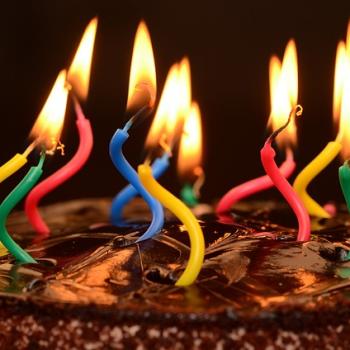And yet, if it was true faith, I wouldn’t worry about the plane falling. At the end Amida would catch me. I would close my eyes and open them to find myself seated on a lotus in the Pure Land. Or so the ancient scriptures say. But in the air I’d trade eternal Buddhahood for a soft landing.
Pure Land Buddhism teaches that the source of our suffering is clinging to egocentricity, accepting the belief that one’s own power is sufficient to overcome the deep anger, greed, and ignorance that mark human life. We are counseled to rely wholly on Other Power, the natural activity of all things to reveal our inner state of enlightenment. Flying plays right into this in a nastily direct way: Unless you’re the pilot, flying is a complete surrender, which is why so many Americans prefer to drive even though it’s a far more dangerous manner of travel. Truly giving up self-power is virtually impossible, especially for pull-yourself-up-by-your-bootstraps Americans. But on a plane you have to relinquish that power -- relinquish it, or go crazy.
This release is aided by the eventual realization that even on the ground our ideas of power and control are really illusions. I was in the World Trade Center two months before the towers fell, attending a three-day conference on Buddhism in America. The plaza was filled with Buddhists from different sects and states. Together we traveled to the top of the towers to gaze out over the city and crawled through the subway systems clutching books by the Dalai Lama. From Raleigh-Durham to LaGuardia, I’d felt intense fear on the plane trip to get there, and again on the trip home. But during the conference itself I felt safe perusing the vendors’ selection of expensive skull-bone bead bracelets and teakwood scripture stands, never worrying that the ceiling would collapse in the middle of a meditation session. Anywhere on the ground seemed preferable to being in the air at the time -- but now I’m not so sure.
***
In October, I was on a plane headed to New York. I read Buddhist scriptures to occupy myself, but my mind kept wandering to terrorism. What would I do if someone tried to hijack the plane? Putting down an ancient text that exhorted compassion for all sentient beings, I mulled my options. I decided that if someone tried to force his way into the cockpit, I’d leap up, rush down the aisle, and knock the hijacker over. Then, I’d take my pen and shove it into his eye, hopefully with sufficient force to push it all the way back into the brain.
After I mentally practiced this exercise a couple times, I went back to reading about Shinran’s address to the pilgrims from far provinces: “If you imagine in me some special knowledge of a path to birth other than the nembutsu or of scriptural writings that teach it, you are greatly mistaken.” In other words, to these travelers who risked everything to meet him and listen to the deepest truth of life, Shinran told them that the nembutsu was enough. All they had to do was give up their self-attachment and everything would work out. It sounds so easy, but I’ve learned that it’s a wrenching requirement to fulfill. With the sharp point of my pen in hand, my faith must be very much in doubt.
You have to just let whatever comes come, be it pleasure or fear. “Please discontinue the use of all portable electronic devices” -- Namu-Amida-Butsu. “Your seat cushion also acts as a flotation device” -- Namu-Amida-Butsu. “Please return to your seat and stow your tray table to an upright and locked position” -- Namu-Amida-Butsu.
Although it’s the most difficult of all difficulties, acceptance is the only option. I fly again on Friday.
This article was first published at Killing the Buddha, a Patheos Partner, and is reprinted with permission.




